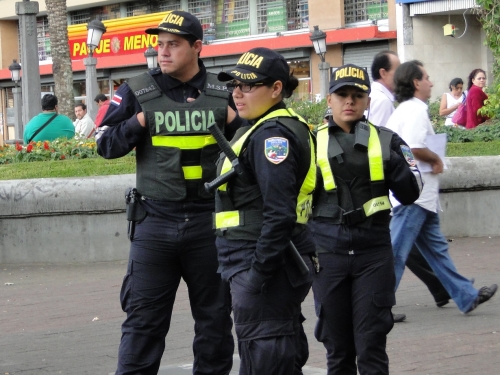
This article was originally published by Southern Pulse on 4 December, 2014.
In recent years Honduras has been on a trajectory to militarize its police force. Towards the end of 2011, the Honduran National Congress approved a decree allowing military personnel to perform duties normally carried out by police officers such as making arrests, disarming civilians and raiding private residences. In 2013, militarization practices became more solidified when Congress authorized the creation of two new forces, the Tropa de Investigación y Grupo de Respuesta Especial de Seguridad (TIGRES) and the Policía Militar del Orden Público, (PMOP, or Military Police). The Military Police currently has 2,000 officers and is expected to reach 5,000 officers. The 2013 legislation granted the PMOP power over patrolling and securing violent neighborhoods and arresting people deemed a threat to public security. This militarization occurred under the guise of what appeared to be the strengthening of a weak and non-functioning police force. The involvement of police in crimes and extrajudicial killings in recent years was used as grounds for the government to slowly phase out traditional methods of law enforcement and implement this new military approach to policing. The paradox herein lies in the fact that military personnel in Honduras have an equally horrific track record of abusing power and human rights.
The one year anniversary of the PMOP was celebrated on 15 September 2014. In August, in the run up to this milestone, prominent social activist Margarita Murillo was gunned down in Villanueva, south of San Pedro Sula. Two journalists were killed in separate incidents in August and the day after marking the one-year anniversary of PMOP a prominent criminal lawyer was shot and killed in San Pedro Sula. These examples are merely a few instances of a growing number of assassinations in Honduras, which has the highest murder rate in the world [i]. It is still unclear who committed these violent crimes but public trust in both police and the military is extremely low. Eyewitness accounts claim seeing members of these institutions at the scenes of many deaths in what would appear to be extrajudicial killings.
While public insecurity rises, the police force in Honduras continues to shrink as the government purges law enforcement personnel. As of September this year, 200 officers were undergoing investigations into abuses of power and 1,400 police officers were removed from duty in a process to clean up the police force that began in 2012. Commissioner Maria Luisa Borjas, former director of the National Police Internal Affairs Unit asserted that the cleansing has not worked and officers who should be in prison were dismissed with honors and important compensations. Borjas also expressed her concern over the growing militarization in Honduras and the direct participation of government security bodies in executions and other violent acts.
On 10 November 2014, the Defense and Security Counsel requested the review and ratification of the decree granting constitutional rank to the Military Police, increasing the concerns over police militarization, since the decree establishes the Military Police will depend on the President directly and the National Police will be part of the Armed Forces. The bill also added 1,000 officers to the PMOP.
Then-General Commissioner of the National Police, Ramón Sabillón, spoke out against the government-backed expansion of military practices within the police force. Presumably as a result of this, Ramon Sabillón was dismissed on 20 November 2014. The National Police has had five different directors since October 2011, with most of them lasting only 6 months in their position.
How does this impact public security? Rather than investing in the existing police force, the government shifted its focus to the newly created Military Police. Throwing money at the PMOP redirects attention (and resources) from potential reforms for the National Police. Militarizing traditional policework blurs the distinction between crime and war, police and military. Given the region’s historic legacies of military rule, expanding military powers into what is traditionally a domestic law enforcement role could delegitimize democratic institutions. Military personnel are trained for combat and critics argue that the PMOP are poorly trained to deal with civil society putting people at risk and potentially exacerbating human rights abuses. A highly-empowered Military Police force, especially in a country struggling with corruption and weak institutions, risks institutionalizing violence in a new way. As it stands, the United States Congress has already withheld 35 percent of financial aid from Honduras in 2014 for not adhering to human rights practices.
While militarizing the police force may reduce violence and increase public security in the short term in targeted areas, the underlying problems of poverty, corruption and a weak judiciary remain the same. The government of Honduras would be better counseled to strengthen civic institutions broadly than to focus its energy on the Military Police.
Alexandra Foggett and Laura Arguello are contributing editors to Southern Pulse.
[i] According to figures published by newspaper La Prensa, in 2013 6,427 homicides occurred in Honduras and 3,367 people were murdered from January to July 2014.
For more information on issues and events that shape our world, please visit ISN Security Watch or browse our resources.

